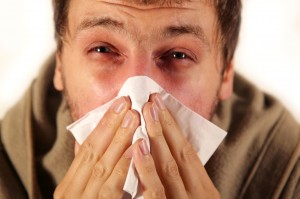Allergies are widespread, affecting 30% or more of the U.S. population. Allergic conjunctivitis and rhinitis (runny nose) can exact a significant toll on individuals. The most common  symptom of eye allergies is itching, which can range from mildly uncomfortable to severely bothersome. Itching and other symptoms which include watery eyes, redness, pain, soreness, stinging and swelling, may reduce a persons ability to perform daily routines or activities at school or work.
symptom of eye allergies is itching, which can range from mildly uncomfortable to severely bothersome. Itching and other symptoms which include watery eyes, redness, pain, soreness, stinging and swelling, may reduce a persons ability to perform daily routines or activities at school or work.
There are two common forms of ocular allergy, seasonal and perennial. Of the two, seasonal allergies are the more common. Seasonal allergies are triggered by seasonal items such as tree, grass and weed pollens that abound in spring and fall. People sensitive to these allergens tend to have symptoms most frequently during those seasons. When the allergies are no longer present, a seasonal allergy sufferer doesn’t have symptoms.
Perennial allergies, by contrast, are triggered by environmental allergens commonly found in the home – such as dust mites, mold spores or animal dander – and do not follow a seasonal distributions. As a result, if you have perennial allergies, you suffer all year long.
Treatment
Avoidance of the allergen or cause of the allergy is the most successful, but unfortunately isn’t always possible. Minimizing contact can still reduce symptoms however. Many people have found relieve with air filters that remove airborne allergens from the home or office. Dust mites or animal dander control measures can help. Keeping the house and car windows closed will minimize allergens. Simply wearing sunglasses as a mechanical barrier and washing hair in the evening can help reduce allergen exposure.
If your symptoms are minimal or intermittent, applying a cold compress (10-15 minutes) may relieve symptoms, especially itching. Artificial tears can bolster ocular defenses by flushing out antigens and can relieve mild ocular allergy symptoms. Benefits of these measures include simplicity, minimal expense and no side effects.
Histamine is central to the allergic reaction and symptoms. Antihistamines are intended to block the effects of histamine. Oral antihistamines can relief systemic symptoms, but may have side effects of sleepiness, dry mouth, and dry eyes. Topical antihistamines target the eye allergy and have less side effects.
Some allergy eye drops combine the antihistamine with mast cell inhibitors. The mast cell inhibitors inhibit the release of histamine and prevent the allergic reaction from starting. I recommend starting this drop at the first sign of symptoms.
For severe eye allergies, a steroid eye drop may be necessary to interrupt the allergic cycle. Steroid eye drops are very effective but have many potential side effects and must be used only as prescribed.
Don’t suffer from allergies. Discuss your symptoms and concerns with Dr. Griffith or Dr. Staton.
One thought to “Allergic Conjunctivitis”
Comments are closed.